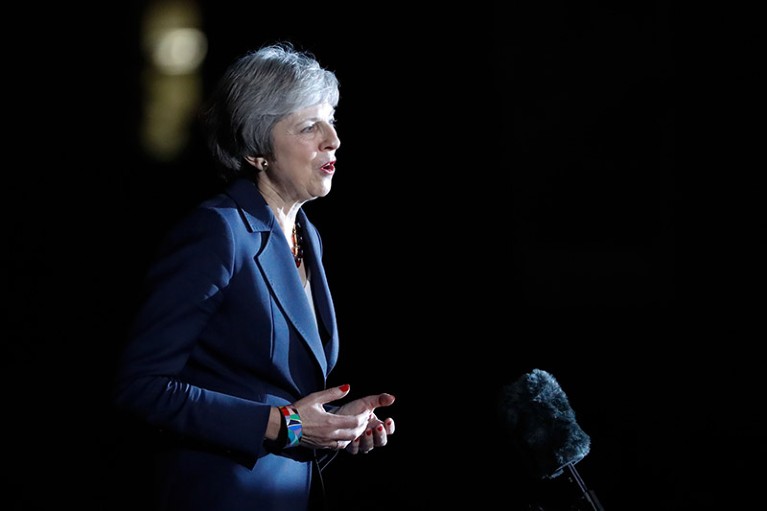Hello Nature readers, this is the news that matters in science today. You can also sign up to get it free in your inbox.

UK Prime Minister Theresa May announced that her Cabinet had backed a draft agreement on Britain’s departure from the European Union. Credit: Tolga Akmen/AFP/Getty
Brexit: what the deal means for science
It’s finally here: after two years of negotiations, British and European Union leaders have negotiated a draft plan for the United Kingdom’s exit from the bloc. For science, many of the details that matter — how UK membership in European research-funding programmes might change, for instance — still need to be thrashed out.
Prime Minister Theresa May has confirmed that if the agreement is approved, free movement between the United Kingdom and EU — something that researchers say has fuelled scientific collaboration — would end. But the agreement would allow EU citizens currently living in Britain, including researchers and their families, to claim permanent residence. The draft deal will go to a vote in parliament on 7 December.
A ‘rising tide of African science’
A pan-African study reveals that researchers on the continent more than trebled their production of research papers between 2005 and 2016. However, only a tiny fraction of Africa-based scientists win big grants of more than US$1 million, and almost half say they don't receive any research funding at all. They are also highly dependent on funding agencies based in Europe, the United States and China.
Reference: The Next Generation of Scientists in Africa report
Coral scientist, former naturopath win prize
Two scientists will share this year’s John Maddox Prize, which is awarded to “individuals who promote sound science and evidence on a matter of public interest, facing difficulty or hostility in doing so”. Coral-reef researcher Terry Hughes has faced criticism from the Australian tourist industry for sounding the alarm over massive bleaching at the Great Barrier Reef. The Centre of Excellence for Coral Reef Studies, of which Hughes is director, recently lost most of its government funding.
Evolutionary biologist Britt Hermes, a former naturopath, shares the award for her work debunking sham alternative treatments. She says that changing her mind about the efficacy of naturopathy for conditions such as cancer cost her friends and led to her being sued for defamation. The Maddox prize is a joint initiative of Sense about Science and Nature, where John Maddox was editor for 22 years.
FEATURES & OPINION
How to turn your passion into a career
From an opera-loving neuroscientist to a rock-climbing physiologist, meet the scientists who have successfully crafted a research career out of their non-academic interests. They share strategies for finding funding, carving out time for your passion while studying and persevering when other people just don’t see the connection.
Relics of ‘the chemists’ war’
The chemical-warfare research laboratory that once occupied land near Washington DC is long gone, but it left a mark in the form of buried munitions and traces of toxic contamination. The New York Times explores the role of chemical-weapons research in the First World War and the ongoing project to clean up the mess it left behind.
The New York Times | 10 min read
Fieldwork without fear
A research programme that has been drawing scientists onto an Alaskan glacier for over 70 years offers a case study in rethinking fieldwork. On the unforgiving ice plain, the leaders of the Juneau Icefield Research Program work to create an inclusive camp free of the harassment that tarnishes field research for many women.
